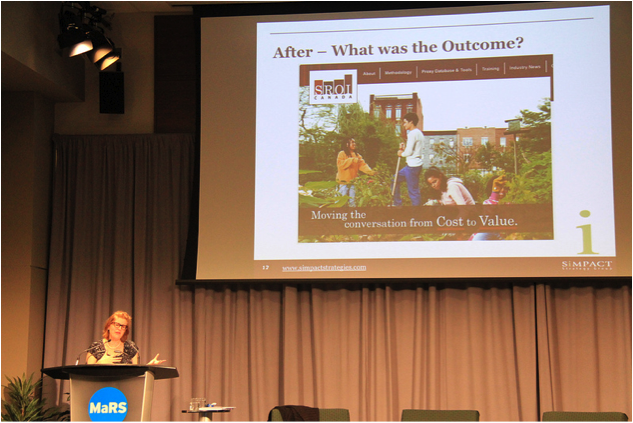There’s More to Measurement Than … Measuring : An Overview of the 2012 Social Finance Forum
It seems logical that “impact” needs to be at the core of an impact investment. But that’s not always the case with the entrepreneur who is seeking the investment.
As Arlene Dickinson of Venture Communications put it, when she considers impact in an investment she asks: “Is the entrepreneur really baking in, right from the very beginning, this triple bottom line mentality? Or are they bolting it on afterwards to appear like they are making a difference? … If it’s bolted on, I’m not interested.”
Dickenson was just one of many experts taking part in the 2012 Social Finance Forum, which brought together over 450 participants from across Canada, earlier this month. Participants brought their own ideas and experiences to the table to demonstrate just how robust the impact investing marketplace is in Canada today.
Dickinson was joined by Andrew Broderick of Vancity and Antony Bugg-Levine of the Nonprofit Finance Fund for the keynote panel “Investor Insights: What is impact?” To begin the conversation about impact measurement, we first had to understand what impact was and the role that measurement can play. Andrew Broderick noted that by defining impact, the organization could then pave the way for setting targets for impact and tracking the impact that the investment was having.
Over the next two days of the forum, an action-packed agenda of workshop sessions and keynote speakers aimed to examine the opportunities and challenges in having an impact and measuring it.
There’s More to Measurement than Measuring
As we discovered, the issues surrounding impact measurement involve more than simply selecting which tool for measurement best suits an organization or which tool needs to be developed to suit an organization. When it comes to measurement, the forum also explored several considerations around what we can learn from what we’ve measured and how measuring is not only a vehicle to understand an impact but also to better understand the problem.

For instance, the workshop “The million-dollar question: How do we value outcomes?” explored the importance of assigning values to the changes that organizations have measured. Understanding the implications of what’s been measured allows stakeholders to have a deeper understanding of the impacts that an organization is having within a larger context.
The workshop, “It takes a village: Collaboration in shared outcomes and measuring together” took measurement one step further by recognizing that complex social and environmental problems that have multiple solutions often work in conjunction with one another. This workshop featured examples of how cross-sector collaborators are working together to measure their impacts. These examples also demonstrated how organizations can better understand the problem that they are solving by looking at the problem through another stakeholder’s lens.
Lastly, when it comes to measurement, although we often measure to determine how successful we have been at achieving our targets, there’s much to be learned from failure. Workshop speakers Ashley Good, with Engineers Without Borders, and Scott Gilmore, with Building Markets, discussed Engineers Without Borders’ annual failure report and “Admitting Failure” initiative. Both reports seek to uncover what can be learned from failures. One of the key messages of the session was that it is unrealistic to think that everything will go according to plan and when it doesn’t, organizations should be prepared to learn from their mistakes and measurement allows them to learn.
Looking forward
As impact investing continues its momentum, it’s clear that business is changing. As more private sector and public sector organizations work together and more social enterprises are born, the role of impact measurement will be critical in demonstrating the positive changes that our generation has on the world. A world that will remember how we measured up.
Tristina Sinopoli is a project coordinator at MaRS Centre for Impact Investing in Toronto, Canada.
- Categories
- Impact Assessment
- Tags
- impact investing
